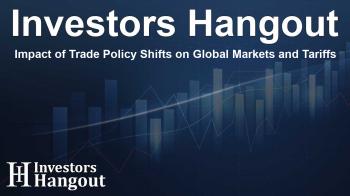Impact of Trade Policy Shifts on Global Markets and Tariffs

Understanding the Recent Shift in Trade Policies
Recently, there have been significant changes in trading policies, notably due to the introduction of new tariffs by the government. As a result of this decision, global stock markets experienced a downturn. However, despite the immediate reaction, many key asset classes have continued to show positive performance throughout the year. Investors are now wondering how these trade policies will affect the overall market stability moving forward.
Current Market Performance Amid Trade Tensions
According to recent performance reports from various market sectors, developed-market stocks, excluding the US, have shown impressive gains. One standout performer is the VEA ETF, reflecting a remarkable increase of 19.1% so far this year. In contrast, US stocks, represented by the VTI ETF, have risen by a more modest 8%. The Global Market Index, which aggregates significant asset classes, indicates an overall annual increase of nearly 10%.
The Influence of New Tariffs
As new tariffs come into play, it’s essential to understand how they will affect market dynamics. This renewed focus on trade wars can influence market forecasts and has potential implications for various sectors of the economy. Markets may need to adjust to a more unstable environment as they navigate these changes.
Regional Responses and Adaptations
Different countries have been reacting to the tariff alterations in varied ways. For example, Mexico has received a temporary suspension of new tariffs, allowing for continued negotiations, whereas Canada has faced a significant increase in tariffs, moving from 25% up to 35%. This disparity in handling policies reflects the unique relationships each country has with the US and the potential strain that new tariffs can introduce into these dynamics.
Evaluating Tariff Impacts Globally
Brazil currently faces the highest tariffs at an alarming 50%. In stark contrast, the UK is experiencing the lowest tariffs among America's trading partners, which sit at 10%. These differences could shift trade balances and force nations to reassess their engagement strategies with US markets.
Economic Outlook Amid Uncertain Policies
The uncertainty around these trade policies raises questions about the global economic climate. Despite fluctuations in tariffs, much of economic activity has remained stable in the recent months following initial announcements. Investors are now intensely analyzing incoming data to gauge the effects of these tariffs on economic expectations.
Expert Opinions on Economic Trends
Economist Raghuram Rajan indicated that this tariff imposition acts as a significant demand shock for the global market and may lead central banks to consider rate adjustments in response to potential economic slowdown. Consequently, the international reaction to US tariffs could catalyze a chain of fiscal changes worldwide.
As additional data emerges, such as the recent PCE inflation figures showing a 2.6% increase compared to last year, indications of upward pressure on prices are becoming evident. This information is critical for economic strategists who need to determine how tariff impacts are influencing inflation rates, which have seen consistent growth in areas such as housing and healthcare.
Future Expectations and Continued Market Evolution
Looking ahead, it is clear that the current state of tariffs and trade policy is subject to change. Experts suggest that the environment will likely evolve in various ways, as ongoing negotiations and shifts in strategy are anticipated. The commentary provided by trade advisor Stephen Olson underscores the notion that these developments are just the beginning of a more dynamic and possibly turbulent trading atmosphere.
As markets adjust to these circumstances, stakeholders will need to stay informed and agile. Investors should be aware that the landscape is still shifting rapidly. Learning to navigate these changes will be crucial for future investment decisions and strategies as we move into upcoming quarters.
Frequently Asked Questions
What are the implications of the new tariffs on the market?
The new tariffs could create volatility in the markets as investors grapple with policy shifts, potentially impacting stocks and other asset classes.
How have the markets performed despite the announcement of new tariffs?
Despite the tariffs, many major market components have shown overall gains for the year, with developed market stocks performing particularly well.
What is the current stance of different countries towards US tariffs?
Countries like Mexico have received temporary waivers for tariffs, while others like Canada have faced increased rates, indicating varied responses to US trade policies.
How do tariffs affect inflation rates?
Tariffs can contribute to rising inflation, as evidenced by recent increases in prices across key sectors like housing and healthcare, which tied to new tariff impacts.
What can we expect in terms of future trade policy changes?
Future trade policies are likely to evolve continuously, and investors should stay informed as negotiations and strategies unfold over the coming months.
About The Author
Contact Addison Perry privately here. Or send an email with ATTN: Addison Perry as the subject to contact@investorshangout.com.
About Investors Hangout
Investors Hangout is a leading online stock forum for financial discussion and learning, offering a wide range of free tools and resources. It draws in traders of all levels, who exchange market knowledge, investigate trading tactics, and keep an eye on industry developments in real time. Featuring financial articles, stock message boards, quotes, charts, company profiles, and live news updates. Through cooperative learning and a wealth of informational resources, it helps users from novices creating their first portfolios to experts honing their techniques. Join Investors Hangout today: https://investorshangout.com/
The content of this article is based on factual, publicly available information and does not represent legal, financial, or investment advice. Investors Hangout does not offer financial advice, and the author is not a licensed financial advisor. Consult a qualified advisor before making any financial or investment decisions based on this article. This article should not be considered advice to purchase, sell, or hold any securities or other investments. If any of the material provided here is inaccurate, please contact us for corrections.

